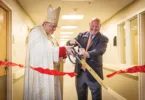
by Olivia Martin
olivia.martin@theleaven.org
ATCHISON — There’s a lot of space devoted to bad habits during the season of Lent.
But imagine forming a habit that has lasted through good times and bad.
A habit that’s been practiced for decades, with no cheating or backsliding.
This is exactly how Benedictine College’s student-run Hunger Coalition began and how it continues: as a habit.
For 35 years straight, the Hunger Coalition has assembled and delivered lunches each weekend — rain or shine, snow or ice — to individuals in the Atchison community who otherwise would have gone hungry.
And it does so without spending a dime.
How it started
In 1981-82, an economic recession hit the United States. Prior to the 2007-09 recession, it hit people harder than anything since the Great Depression — impacting jobs, stress levels and the family environment.
Atchison, an industrial community, was hit particularly hard. Unemployment reached 10.5 percent.
“A number of students [at Benedictine College] said, ‘We have to do something,’” said Dr. Richard Coronado, chairman of the economics department at Benedictine.
A student at the time suggested adopting a skip-a-meal program at the college as a response.
Following the skip-a-meal model, students with a prepaid meal plan would abstain from eating dinner in the dining hall each Wednesday evening.
In turn, the dining hall produces less food that day, donating the remainder of what would have been prepared to be used for sack lunches to be distributed to those in need.
Aside from the college’s standard $150 yearly club grant, the Hunger Coalition receives no money from the administration.
“We don’t really need any money to do what we do,” said Coronado. “I think that’s a good way to run this kind of operation.”
So in 1984, using the skip-a-meal program model, Coronado and students on Benedictine’s World Hunger Committee banded together to form the Hunger Coalition, adopting Mother Teresa as its patroness.
“We began with 20 people or so skipping meals,” said Coronado. “But now, we have 365 students skipping meals.”
Then, on Fridays, 10-15 students assemble the sack lunches, which consist of sandwiches, chips, cookies, fruit and juice.
The next day, a small group of students with cars deliver the lunches across Atchison.
Monica McDonough, a senior education major and vice president of the Hunger Coalition, said getting to know the Atchison community by delivering the lunches is one of her favorite parts of being involved with the Hunger Coalition.
“Benedictine itself is very blessed,” said McDonough. “We have a lot of resources, our campus is gorgeous and we’re kind of an oasis within Atchison. [But] you don’t see the poverty that really exists here until you go down the road a few miles.”
Who’s involved
Participation in the Hunger Coalition is not limited to students.
Faculty and staff step up to help when there is a shortage of delivery drivers and during each period students are absent.
Joseph Wurtz, Benedictine College dean of students, has been involved with Hunger Coalition since his college days in the late ’90s. And he keeps coming back for more.
“It all started on a normal day walking into the dining hall,” he said. “Some people asked me to join skip-a-meal. Then later, I began driving on the weekends for Hunger Coalition.”
Now, he sees the Hunger Coalition as a valuable opportunity for his children.
“Hunger Coalition has helped me see dignity in all people,” said Wurtz. “It helps me grow in compassion for their situation.
“I — as a father — now translate that message to my own children to help them learn the importance of compassion and gratitude.”
Tona Stone, the student collections specialist for Benedictine’s business office, agreed.
“One of the biggest reasons why [I’m involved] is because it directly affects our community,” she said.
“I’m not a Catholic,” Stone continued, “but [Hunger Coalition] has strengthened my faith in people. It’s let me see there are a lot of good people still out there.”
Wurtz agreed.
“As Mother Teresa said when she visited [the college], he who serves the poor, serves God,” he said. “Encountering the poor has you face hardships and realities that make you question a lot of things about your own humanity.
“We are an institution of learning, and I think there is no better way than encountering the poor and learning about their life and situation — about justice and mercy.”
For Coronado, serving the hungry is indeed the way he is able to help students apply what they learn in his courses.
“We all share a vocation to help meet the urgent needs of the people of the world,” said Coronado.
Referencing Pope Emeritus Benedict XVI’s reaching on sharing one’s gifts and talents with the poor, Coronado said:
“In the economy of charity to which we are all called, in which we are called to give not only what we have but who we are, we must work hard to develop our talents.”
The Hunger Coalition has harnessed the talents of literally generations of Benedictine College students and teachers in an effort that has led them to rediscover their common humanity.
“I’ve certainly been grateful for the opportunity to do this,” said Coronado. “It’s become a part of me.”






